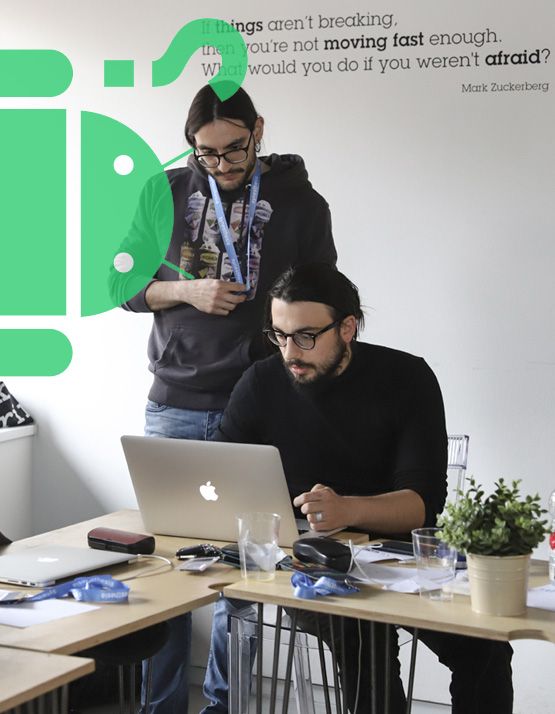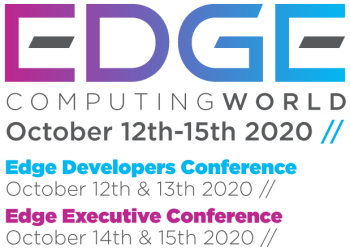
droidcon MEC Hackathon
Online Hackathon-25/26 November final days
Call for Edge Computing Developers for 5G and Android
This is a fully remote event.
You can star working remotely and present your project via Cisco Webex.
You can present your work remotely.
If you need assistance with the technologies you’ll find information, manuals and experts you can contact during the remote Hackathon and on-site at the Hackathon final days (25-26 November).
Final result
The Winner of the hackaton is the UniMore team composed by Stefano Mariani (https://smarianimore.github.io) and Marco Picone (https://marcopicone.net/), researchers at the Department of Sciences and Methods for Engineering of the University of Modena and Reggio Emilia, with a project on Cognitive mobility at the Edge.
The project exploits features and services provided by the 5G MEC architecture in order to deliver low-latency location-based event notifications about traffic, congestion forecast, and mobility patterns.
As a part of the final software prototype, the UniMore team also released the Openness Connector java library on Github to ease the life of developers willing to interact with the MEC API provided by the Openness platform.
the webinar series
WHAT IS THE HACKATHON?
Develop mobile applications for advanced services in MEC-enabled 5G networks
The droidcon MEC Hackathon was a cutting edge competition designed to test your skills and abilities as a Multi-Access Edge Application developer!
Developers also had the chance to gain remote access in advance to real MEC platforms.
Edge computing Webinar series – 25 & 26 November
You will learn how to use the ETSI MEC APIs, and how to develop applications at the edge of the network through Technical MEC Tutorials and masterclasses
Full program here:https://it.droidcon.com/2020/wp-content/uploads/mec-agenda.pdf
droidcon MEC Hackathon 2020
The 5G challenge
MEC (Multi-access Edge Computing) can serve many key 5G use cases. Most of them are related to application scenarios specifically targeted to vertical markets of the 5G era. The purpose of this Hackathon is to demonstrate the usage of MEC system as an enabler for different use cases and business objectives, helping all stakeholders to develop a diverse, open MEC ecosystem.

Examples of MEC-enabled vertical segments applications include (but are not limited to) the following big categories of use cases (here called blueprints):
- automotive
- factories of the future
- drones
- consumer, media and entertainment
Submissions for one of the blueprints are allowed. In addition, as a special prize, for this edition of the Hackathon, developers are encouraged to focus on the automotive domain, in synergy with the Smart Road project (https://www.torinocitylab.com/en/).
Developers’ teams at the Hackathon will be tasked to develop Android applications for services in MEC-enabled networks, running on OpenNESS platform (1) from Intel and using ETSI MEC technologies (2).
Candidate developers’ teams are free to choose a specific challenge/blueprint adhering to the above topics. To inspire ideas, the following use case example is provided (link: here ).
Of course, candidates are encouraged to reuse their existing or past projects with their applications, and apply/adapt to the present challenge. In addition, teams will learn and exploit the ETSI MEC APIs running on the MEC Hosts at the competition (e.g. Location API, … ). (3)
An explanation of the usage of the available Location API (kindly provided by LINKS Foundation) can be founds here
On any of the above use case/blueprint or any problem that you are working on, please take up the challenge (optional) to see how the following can help you (4):
-
- Data Parallel C++ or DPC++ cross-architecture language from the oneAPI initiative to create custom accelerators on the FPGA for your kernel algorithm.
- OpenVINO™ toolkit to accelerate deep learning inference tasks for computer vision applications. The OpenVINO toolkit includes various neural network topologies and enables deep learning inference acceleration.

- OpenNESS: the easy button to deploy innovative services at the Edge. OpenNESS is an open source reference toolkit that makes it easy to move applications from the Cloud to the Network and On-Premise Edge. https://www.openness.org/
- Please refer also to the ETSI white paper “Developing software for MEC”, available via this link.
- For more information on the ETSI MEC standard (including MEC architecture and MEC APIs), you can check the specification tab at this URL.
- You can use Intel® oneAPI toolkits and the Intel® Distribution of OpenVINO™ toolkit on the Intel® DevCloud to understand what they do and how they can help you.
THE GUIDE ON HOW
TO USE MEC APIS
This report will provide guidance for software developers on how to properly approach architecting and developing applications with components that will run in edge clouds
Team submission guidelines
-
Team size: 5 members (maximum)
-
Submissions should be sent through the application form via the following link https://droidcon-mec-hackathon.eventbrite.it. They should include a description of the idea; the target MEC application; information on any intention to reuse / integrate code from past activities, or other projects / prototypes / products (highly recommended); and a short CV for each team member. Any supporting material (e.g. short video clips) related to the idea is welcome. IMPORTANT: Submissions should clearly state how the team intends to use ETSI MEC APIs (available at https://forge.etsi.org/).
NOTE: Whilst the use of MEC service APIs is not mandatory, teams are encouraged to utilize them. -
Submission due date: Extended to 15 June!
Submissions will be evaluated by the Droidcon MEC Hackathon Organizing Committee based on various criteria, e.g. relevance to the Call for Developers, assessed relevance of the selected use case, usage of MEC APIs, composition of the team, level of maturity of the project. -
Selected teams will be notified by 30 June 2020. Participants selected for the competition will be also admitted to join the Intel® Edge Builders program
-
Cost: The submission is free of charge, as well as the Hackathon attendance for the selected teams
-
Venue:
https://teams.webex.com/
Prizes
At the end of the competition there will be an awards ceremony, at the main Droidcon conference (on 16 april) with a number of prizes, courtesy of the Organizing Committee:
- The venue host Synesthesia will provide the winners:
10 free passes for a future Droidcon conference (2020/2021).
- Intel will offer:
Amazon echo devices to the first 3 teams.
The developers from the winner team will be eligible to be part of Intel Software Innovator program (https://software.intel.com/en-us/intel-software-innovators) and their project will be eligible to be featured as an Intel Early Innovation Project. This means that the project will be eligible for stipend to produce/present a tutorial/paper on their project, hardware funds for their project, and other start up mentorship program. - Turin City will offer:
The winners will be offered the possibility to participate to the Smart Road project (a consortium of partners, from car makers, network operators, universities and the City of Turin), with the aim of proposing their developed solution as possible implementation for testing activities in the urban environment of Turin. - Special prizes will be offered by the organizing committee in correspondence to particular achievements of the developers teams, for some of the following (optional) challenges: usage of openVINO toolkit, or DPC++ framework.
All MEC Hackathon participants will have a free pass for droidcon Italy 2020!
And will have a great opportunity for networking with the Droidcon conference attendants who represent key stakeholders of the industry from all corners of the world.







